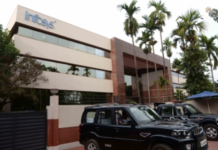By Arun Kumar Das
New Delhi– SBI Capital Markets will evaluate Indian Railways’ overhead equipment (OHE) network for electrical traction as the state-run transporter is exploring the monetisation of its transmission assets.
Expecting to raise about Rs 25,000 crore from monetistion of these assets, the Railways has asked SBI Caps to study its transmission and distribution network for valuation and submit a report next month.
Railways has about 25,000 km of electrified routes involving OHE through which electric locomotives draw power for running trains and an action plan finalised by Railway Minister Piyush Goyal has envisaged the complete electrification of the network by 2020-21.
The plan entails drastic reduction on the expenditure on fossil fuels by shifting to complete electrification of the rail routes across the country.
Accordingly, the electrification of about 24,400 km of railway tracks by 2020-21 at an estimated cost of Rs 35,000 crore is expected to reflect on the forthcoming budget.
“The decision to monetise the transmission assets has been taken with the aim of raising resources from within and depending less on gross budgetary support (GBS),” a senior Railways official said.
As per the plan, the Railways is discussing with the Power Grid Corporation of India Ltd (PGCIL), a Power Ministry subsidiary, to form a special purpose vehicle (SPV) for this purpose.
The SPV will raise funds from the market for the Railways and the public transporter will pay a fixed price as lease amount to the SPV. However, the operation and maintenance of the electric lines will be with the Railways.
The state-run transporter is expecting that the funds from transmission assets will give a boost to its capacity expansion plans without depending on the GBS.
The valuation of OHE infrastructure, the amount of lease and other related issues will be dealt with in the SBI Caps report, the official said.
The plan outlay of the Railways in the Budget 2018-19 is likely to go up from Rs 1.31 lakh crore to 1.46 lakh crore for the next fiscal.
Finance Minister Arun Jaitley will present the budget on February 1, the last full budget of the present govermnent ahead of the general elections in 2019 amid rising global crude oil prices and dipping Goods and Services Tax (GST) collections.
Prime Minister Narendra Modi’s government is likely to stick to its fiscal consolidation commitments though there are expectations that the budget would lighten the tax burden of the middle class.
The Railways component of the main budget is expected to boost infrastructure investments in order to step up the growth momentum. (IANS)






